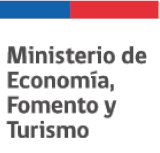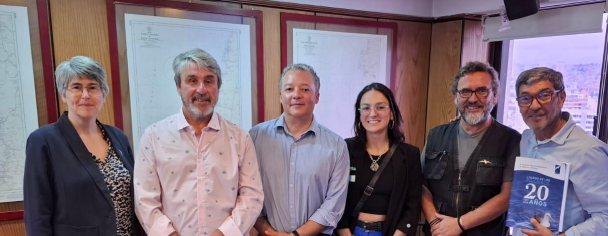
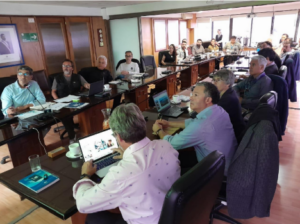 Dr. Jo Gilbert, international director of the Royal Society for the Protection of Birds of the United Kingdom, highlighted Chile’s progress in this area through the work of Subpesca, Sernapesca, and IFOP.
Dr. Jo Gilbert, international director of the Royal Society for the Protection of Birds of the United Kingdom, highlighted Chile’s progress in this area through the work of Subpesca, Sernapesca, and IFOP.
At the offices of the Undersecretariat of Fisheries and Aquaculture (Subpesca), the international director of the Royal Society for the Protection of Birds of the United Kingdom (RSPB), Dr. Jo Gilbert, accompanied by Esteban Frere, representative of Birdlife International’s Marine Program at the Latin American level, met with professionals from Subpesca, Sernapesca, and IFOP to exchange information on strategies for monitoring and reducing seabird bycatch and to highlight the work Chile has been doing in this area.
“Many species of albatrosses and petrels depend on Chile’s highly productive waters, sharing abundant marine resources with fishing activities operating along Chile’s Exclusive Economic Zone… Bycatch of seabirds in fisheries remains the most impactful threat facing these birds, and for this reason, the adoption and implementation of bycatch mitigation measures to reduce this impact is crucial in all areas where there is an overlap between seabirds and fisheries,” explained Dr. Jo Gilbert, RSPB International Director.
Luis Adasme, IFOP researcher, chair of the Chilean seabird working group and Chile’s official representative to ACAP, said: “Receiving recognition from important international organizations, highlighting the work carried out by Chile and its clear progress in reducing seabird bycatch in fisheries, is inspiring and clearly demonstrates the fruits of the effort and commitment of our fisheries institutions—the Undersecretariat of Fisheries, the Fisheries Development Institute (IFOP), and the National Fisheries Service (SERNAPESCA)—to advance, understand, and find solutions to the challenges posed by mitigating bycatch in fishing operations.”
During the meeting, Luis Cocas and Marcelo García, Subpesca professionals, highlighted the work being carried out by Chile, a country considered one of the pioneers in comprehensively addressing this problem (discards and bycatch) and a global leader in the field, due to its progressive approach. Prior to adopting reduction measures, a research phase was conducted to gather technical information using IFOP scientific observers on board the various fishing fleets. Furthermore, modern mechanisms for monitoring these practices at sea, such as onboard camera systems and electronic logbooks, have recently been implemented, along with specific plans and the maintenance of observer programs for scientific purposes.
Currently, Chile has implemented measures to prevent or minimize incidental catches of seabirds in trawl and longline fisheries by making it mandatory to use and carry devices such as bird scaring lines (BRLs), which are two ropes or cords deployed from the stern of vessels to which distinctively colored garlands are attached. These cords prevent birds from approaching the set cables (the cables that drag the net). In the case of medium-sized or smaller vessels, the BRL can be replaced with a “bird buffer,” a folding structure or grid that, similar to BRLs, also prevents birds from approaching the set cable. Some vessels also have a snatch block, which minimizes the risk of birds striking the third cable or the net sounding cable.
“Subpesca and Sernapesca have demonstrated how scientific evidence can “Facilitate decision-making and the creation of effective regulations that benefit birds and ensure the safety of fishing crews. The steps taken by Chile to introduce seabird regulations and the expanded monitoring of fishing operations through electronic systems represent concrete actions for the conservation of vulnerable seabird populations. This is extremely positive,” Dr. Gilbert emphasized.
Additionally, at the event, Esteban Frere, representative of Birdlife International’s Marine Program for Latin America, explained how this program supports international efforts to reduce seabird bycatch through the coordination of activities, information sharing, and convening of discussions that contribute to gradual changes in collective capacity. He emphasized that doing so benefits local initiatives between NGOs, industry, and governments.
The Royal Society for the Protection of Birds is Europe’s largest non-profit organization dedicated to the protection of birds and wildlife.
The Albatross Working Group launched by the RSPB
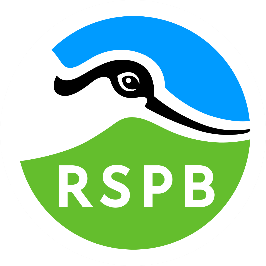
The Royal Society for the Protection of Birds (RSPB) launched the Albatross Working Group (ATF) in the 2000s to bridge the gap between the best available science and the practical implementation of bycatch mitigation measures in high-priority fisheries.
“In Chile, we have supported conservation action through collaboration with teams like ATF-Chile since 2007. We celebrate the country’s progress made through collaboration between local professionals, the fishing industry, and the government to develop and critically evaluate mitigation measures, which in turn has informed the working groups of the Agreement on the Conservation of Albatrosses and Petrels (ACAP) and informed national frameworks, such as the National Action Plan to Reduce Seabird Catches,” Gilbert stated.
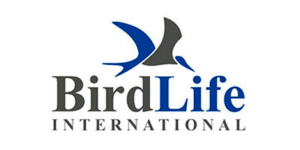
Both the United Kingdom and Chile are members of ACAP, which provides expert scientific advice on best practices for seabird catch mitigation measures. This advice helps equip governments and industry with solutions to reduce the impact of fishing operations without affecting the catch of target species.
“It was very important for me to visit Chile and learn about the progress being made, so I could bring back to the UK examples of how government and industry have adopted and implemented positive conservation measures that could be transferred to our own national context,” said the RSPB international director.



